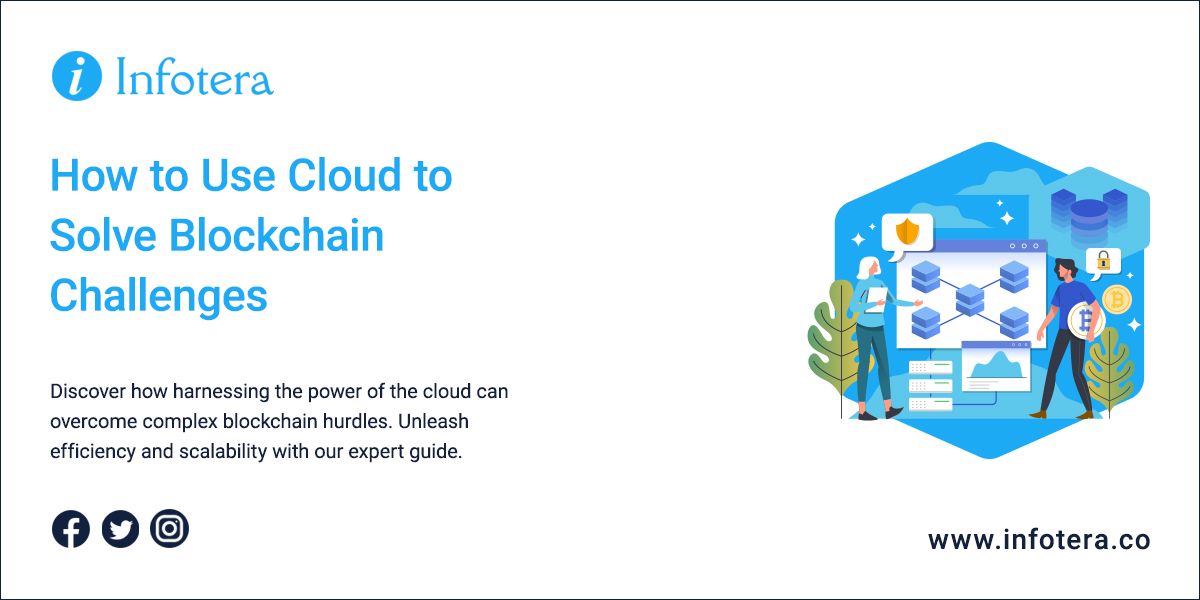In today’s rapidly evolving technological landscape, both blockchain and cloud computing have emerged as game-changing innovations. Blockchain technology ensures secure and transparent transactions, while cloud computing provides scalable and flexible resources.
However, as with any technological advancement, challenges arise. Integrating these two powerful technologies might seem complex, but with the right approach, you can leverage the cloud to solve various blockchain challenges.
Introduction
Blockchain, the decentralized and tamper-proof digital ledger, has transformed industries by ensuring trust and transparency. However, it’s not without its challenges. Issues such as scalability, data privacy, and energy consumption have posed obstacles to its widespread adoption.
Enter cloud computing, a technology that provides on-demand resources, scalability, and enhanced security. By harnessing the power of the cloud, these blockchain challenges can be effectively addressed.
Understanding Blockchain Challenges
Scalability Issues
One of the primary challenges faced by blockchain technology is scalability. Traditional blockchains struggle to handle a high volume of transactions, leading to slower processing times and increased costs.
Data Privacy and Security
While blockchain transactions are inherently secure, the underlying data can sometimes be vulnerable. Ensuring data privacy without compromising the decentralized nature of blockchain is a complex task.
High Energy Consumption
Blockchain’s consensus mechanisms, like Proof of Work, demand significant computational power, resulting in high energy consumption. This environmental concern needs to be mitigated.
The Role of Cloud in Addressing Blockchain Challenges
Scalability Solutions
Cloud computing offers scalable infrastructure that can dynamically adapt to changing workloads. By integrating blockchain with the cloud, networks can expand or contract based on demand, addressing the scalability challenge.
Enhanced Security Measures
Cloud platforms provide robust security features, including encryption and access controls. By storing encrypted blockchain data in the cloud, data privacy and security concerns can be alleviated.
Energy Efficiency through Cloud
Cloud services operate in data centers optimized for energy efficiency. By offloading resource-intensive blockchain processes to the cloud, energy consumption can be significantly reduced.
Implementing Cloud Solutions for Blockchain Challenges
Hybrid Cloud Configurations
A hybrid cloud approach combines public and private cloud resources with on-premises infrastructure. This setup offers flexibility and enables blockchain networks to scale seamlessly.
Encryption and Access Control
Cloud environments offer advanced encryption methods and precise access controls. By encrypting data and managing access, blockchain’s data privacy and security challenges can be tackled.
Smart Contracts Optimization
Smart contracts are integral to blockchain ecosystems. Cloud-based tools can enhance the execution and management of smart contracts, making them more efficient and reducing transaction costs.
Benefits of Cloud-Blockchain Integration
Improved Scalability
The synergy of blockchain and cloud enables horizontal scalability, allowing networks to accommodate a higher number of transactions without compromising performance.
Heightened Security
Cloud-based security measures bolster the already robust security of blockchain technology, assuring users that their data remains private and tamper-proof.
Sustainable Energy Usage
By leveraging the energy-efficient infrastructure of cloud providers, the carbon footprint of blockchain operations can be minimized.
Best Practices for Seamless Integration
Choosing the Right Cloud Service Model
Selecting the appropriate cloud service model (IaaS, PaaS, or SaaS) is crucial. Different blockchain use cases may require specific models for optimal results.
Ensuring Interoperability
For a successful integration, ensure that the cloud and blockchain systems can communicate seamlessly. Standards and protocols should be adhered to.
Monitoring and Maintenance
Continuous monitoring and maintenance are essential. Regular updates, patches, and performance optimization guarantee a stable and secure hybrid environment.
Real-world Use Cases
Supply Chain Management
Integrating blockchain with the cloud streamlines supply chain processes, ensuring transparency, traceability, and efficiency across the entire supply network.
Digital Identity Verification
Cloud-blockchain integration can revolutionize identity verification by securely managing and validating personal information, reducing the risk of data breaches.
Healthcare Data Exchange
Blockchain-cloud synergy can facilitate secure and efficient exchange of healthcare data among providers while maintaining patient privacy and data integrity.
Future Trends in Cloud-Blockchain Synergy
Multi-Chain Networks
The future might see the rise of multi-chain networks, where different blockchains collaborate within a cloud-based ecosystem, enhancing interoperability.
Federated Cloud Solutions
Federated clouds, formed by multiple interconnected cloud providers, could offer even more flexibility and redundancy to support complex blockchain applications.
Conclusion
In conclusion, the seamless integration of blockchain and cloud computing holds the potential to overcome existing challenges, fostering innovation and scalability. By embracing hybrid cloud solutions, leveraging robust security measures, and optimizing smart contracts, businesses can harness the power of these technologies in harmony. The synergy of cloud and blockchain not only addresses challenges but also paves the way for new possibilities across industries.
FAQs
- Is cloud-blockchain integration suitable for small businesses? Yes, cloud-blockchain integration can benefit small businesses by offering scalable solutions and enhanced security.
- What are the risks associated with cloud-blockchain integration? Risks include potential security vulnerabilities and the need for careful selection of cloud service models.
- Can cloud-blockchain synergy reduce transaction costs? Absolutely, by optimizing smart contracts and enhancing scalability, transaction costs can be significantly reduced.
- Are there any regulatory concerns with cloud-blockchain integration? Regulatory concerns vary by industry and location, but careful adherence to data privacy regulations is crucial.
- How can I get started with cloud-blockchain integration for my business? Begin by assessing your business needs, exploring cloud service options, and consulting experts in the field to design a tailored solution.

